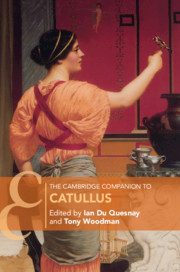Book contents
- The Cambridge Companion to Catullus
- The Cambridge Companion to Catullus
- Copyright page
- Contents
- Notes on Contributors
- Preface
- Introduction
- Chapter 1 Situating Catullus
- Chapter 2 Literary Liaisons
- Chapter 3 Catullan Intertextuality
- Chapter 4 Gender and Sexuality
- Chapter 5 Catullan Themes
- Chapter 6 Language and Style
- Chapter 7 Catullus and Metre
- Chapter 8 Catulli Carmina
- Chapter 9 Catullus and Augustan Poetry
- Chapter 10 Rewriting Catullus in the Flavian Age
- Chapter 11 The Manuscripts and Transmission of the Text
- Chapter 12 Editions and Commentaries
- Chapter 13 Catullus in the Renaissance
- Chapter 14 Catullus and Poetry in English since 1750
- Abbreviations and Bibliography
- Index Locorum
- General Index
Chapter 2 - Literary Liaisons
Published online by Cambridge University Press: 09 April 2021
- The Cambridge Companion to Catullus
- The Cambridge Companion to Catullus
- Copyright page
- Contents
- Notes on Contributors
- Preface
- Introduction
- Chapter 1 Situating Catullus
- Chapter 2 Literary Liaisons
- Chapter 3 Catullan Intertextuality
- Chapter 4 Gender and Sexuality
- Chapter 5 Catullan Themes
- Chapter 6 Language and Style
- Chapter 7 Catullus and Metre
- Chapter 8 Catulli Carmina
- Chapter 9 Catullus and Augustan Poetry
- Chapter 10 Rewriting Catullus in the Flavian Age
- Chapter 11 The Manuscripts and Transmission of the Text
- Chapter 12 Editions and Commentaries
- Chapter 13 Catullus in the Renaissance
- Chapter 14 Catullus and Poetry in English since 1750
- Abbreviations and Bibliography
- Index Locorum
- General Index
Summary
On an October afternoon two hundred years ago the poet John Keats paid a visit to his friend and literary mentor, Leigh Hunt. They were so absorbed in their conversation that they forgot the time, and Keats was obliged to spend the night in Hunt’s cottage, where an extemporary bed was made up for him in the library. But he failed to drop off to sleep, so stimulated was he not only by the conversation with his friend but also by his literary surroundings. He therefore resorted to writing part of the poem later known as Sleep and Poetry, in which he describes the circumstances of the poem’s genesis, attacks the poets of a previous generation, and delivers a manifesto for the new poets such as Hunt himself.
- Type
- Chapter
- Information
- The Cambridge Companion to Catullus , pp. 26 - 46Publisher: Cambridge University PressPrint publication year: 2021
- 1
- Cited by

